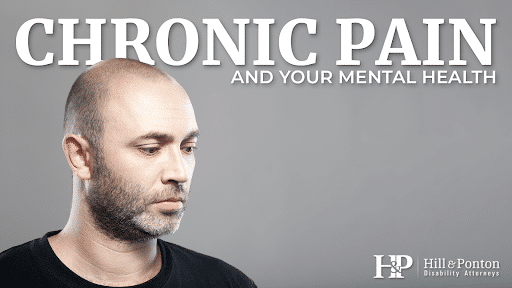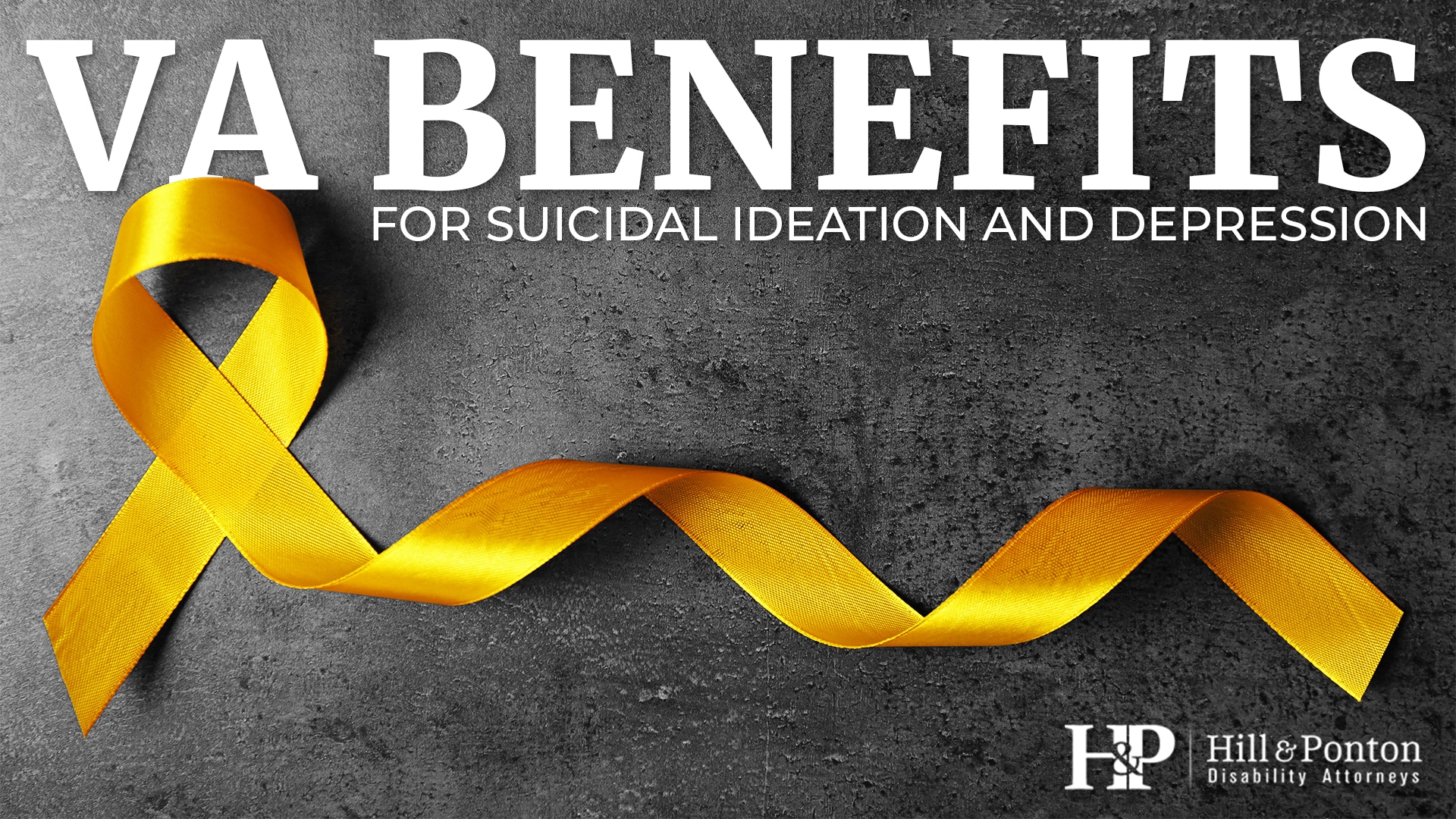VA Benefits: Depression Secondary to Chronic Pain
While we often think of the physical injuries and illnesses that can result from military service, it’s also important to consider the ways in which disability can affect mental health. Military service members can experience a number of mental health challenges as a result of their disability or medical condition.
One common link that we often see is depression secondary to chronic pain. The United States Department of Veterans Affairs considers depression as one of the secondary conditions of chronic pain. So, if you’re experiencing these conditions, you may be eligible for veterans disability compensation.
Here, we will break down the basics of depression secondary to chronic pain, how to prove service connection, and how the VA rates mental disorders.
What Is Chronic Pain?
Chronic pain is defined as pain that persists for at least six months or more and is usually caused by an injury or illness. Living with chronic pain goes beyond the initial injury and pain itself. As you will see below, the effect that chronic pain has on you mentally can be profound.
What Is The Link Between Chronic Pain & Mental Health?

Chronic pain can impact daily living for many veterans, which can head to a number of mental health challenges. Among the list of complications that chronic pain sufferers can endure are depression and its resulting symptoms:
- Depression: Depression can negatively affect the way you feel, the way you think and the way you act. Depression can cause you to lose interest in activities or hobbies you once enjoyed and depression may make you feel the need to separate yourself from your loved ones.manifest into feelings of sadness and despair. Your ability to function at home and work can diminish or be greatly affected.
- Insomnia or lack of sleep: Chronic pain causes sleep difficulties for some veterans. When experiencing insomnia, you have difficulty falling asleep or staying asleep. You may also wake up tired or fatigued and have poor concentration or focus throughout your day.
- Suicidal ideation: You may have thoughts of harming yourself. These thoughts can range from considering the act to actually developing a detailed plan. You may find yourself having fleeting or floating thoughts, considering what type of medication in your medicine cabinet could harm you, or causing or inflicting pain upon yourself.
- Memory and/or cognitive issues: These issues are usually noticed when you begin having trouble remembering, making decisions, or misplacing objects. You may notice that you are unable to recall names of close friends or relatives, numbers, places, or where you have placed things. These memory challenges can interfere with daily activities.

- Anger and Irritability: You may experience outbursts that often seem unprovoked or unwarranted. You may also become easily frustrated.
- Isolation or social withdrawal: You may feel the need to separate yourself from others. You may seek solitude or avoid friends/family and activities you once enjoyed.
- Problems maintaining relationships: You may create conflicts or excuses to avoid family functions or friendly outings. You may experience difficulty communicating with your friends and family how you feel or feel as though you are a burden.
- Feelings of hopelessness, worthlessness, and helplessness: You may feel a lack of hope or as if there is no future for you. You may feel as if you have nothing to offer to anyone and that you don’t contribute to society. You may feel powerless about your situation.
- Abusing substances: You may begin abusing alcohol or drugs.
- Anxiety and/or anxiety attacks: You may feel worried and nervous about different situations. This can often cause anxiety attacks to occur.

How Does The VA Rate Depression Secondary to Chronic Pain?
As discussed in a previous blog post, the VA doesn’t rate chronic pain syndrome as its own disability. This is because they don’t have a diagnostic code for chronic pain in general. Rather, they award a disability rating based on the symptoms on the chronic pain.
So, veterans seeking a percent rating for depression secondary to chronic pain will need to prove secondary service connection through medical evidence.
Pain and the Brain: The Link for Your VA Disability Claim
If you had a service-connected back condition that caused chronic pain and that back pain led to depression, you would be able to file for depression secondary to your back condition.
Numerous studies have identified how pain can directly impact your brain and mental health. However, the VA doesn’t recognize chronic pain as its own condition and therefore, your condition must be rated as the symptom your chronic pain has produced. These claims would be considered as resulting secondary to your service-connected condition. As an example, if you had a service-connected back condition that caused chronic pain and that chronic pain led to your development of depression, the claim would be considered depression secondary to your service connected back condition.
Beyond your initial claim, it is important to consider how your mental health condition has impacted your life at home and work. While your physical condition may interfere with your ability to maintain employment, you should not be so quick to disregard the role that your mental condition takes either. An independent medical evaluation, resulting in a medical opinion, by a private doctor can help build your case and support your claim by specifying the limitations you encounter on a daily basis. These physical limitations can include the inability to lift, carry, sit, stand, walk, and climb. Medical evidence from a health care provider of these limitations can help your claim. Be sure to keep copies of your treatment records to support your claim.

In regards to mental conditions, the limitations can include: decreased concentration, lack of stamina, feeling overwhelmed and unable to handle tasks/deadlines, difficulty interacting with customers or co-workers, and difficulty accepting feedback or criticism. A diagnosis of depression and medical evidence documenting these mental limitations can be helpful as well.
For example, a veteran with a back condition has suffered for years from chronic pain. As a result, he has developed severe depression and anxiety. Now, he struggles at work due to his ever-growing task list and finds himself unable to not only handle the pressure but concentrate on completing the tasks. On top of that, he’s required to interact with clients and the mere thought alone leaves him feeling nervous and sends his heart racing. He has to take multiple breaks throughout the day to gather his thoughts and catch his breath. Using this example, it is easier to visualize how chronic pain can impact you far beyond the physical sense.
Have Questions About VA Depression Secondary to Chronic Pain?
If the VA has denied your veterans’ claim for depression secondary to chronic pain, contact the team at Hill & Ponton today. Our law firm is committed to helping veterans obtain an accurate VA disability rating and VA disability compensation. We can ensure that you are presenting the right medical records for your case. We are also available to guide you through the appeals process to obtain the veterans benefits you deserve. Contact us today to get started.

Mental Health Resources Available for Veterans
Recognizing these symptoms and taking proactive measures is the key to a better recovery. The VA offers many programs specifically for mental health and mental health awareness. On their website, you can access many articles discussing mental health conditions in-depth, as well as find mental health support either locally or virtually.
For more information regarding mental health topics, please visit: https://www.mentalhealth.va.gov/
If you are a Veteran in crisis — or you’re concerned about one — free, confidential support is available 24/7. Call the Veterans Crisis Line at 1-800-273-8255 and Press 1 or send a text message to 838255. Chatting is also available online at https://www.veteranscrisisline.net/




